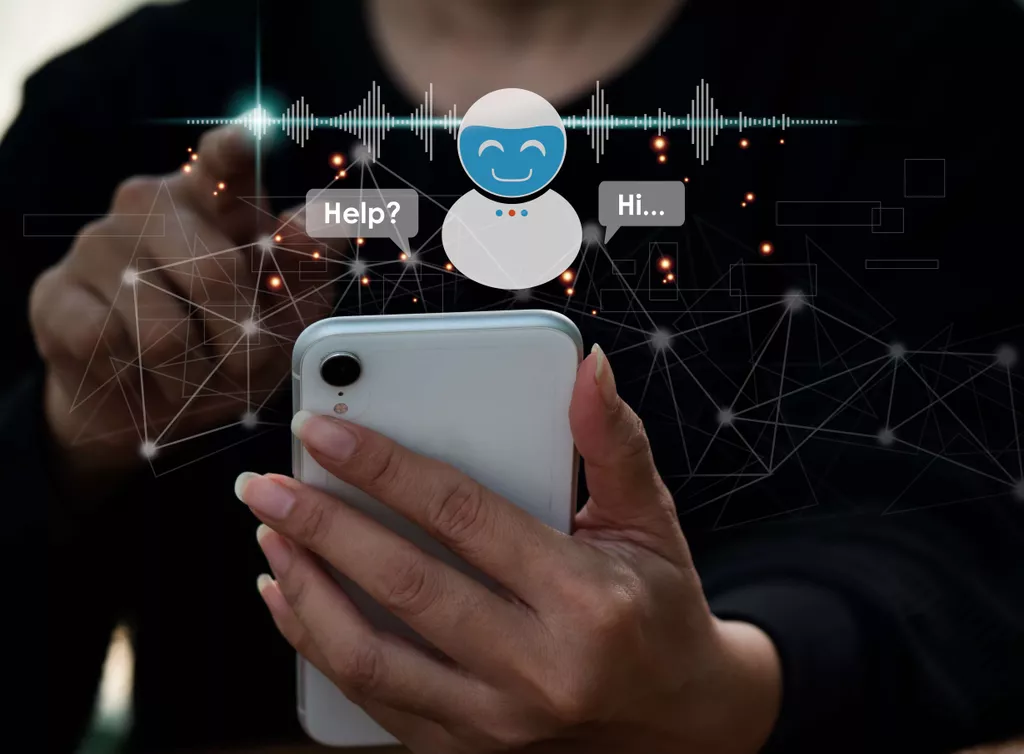Digital marketing has made it possible to reach potential customers in the insurance business through a variety of platforms. The customer moves on to another supplier if an agent isn’t accessible to provide pertinent information as and when they need it. This advancements are paving the way towards enhanced customer experience and opening doors for fresh business opportunities for the Insurance sector. At the same time, 44% of customers prefer using chatbots to make insurance claims.
Using information from back-end systems and contextual data, a chatbot can also reach out proactively to policyholders before they contact the insurance company themselves. For example, after a major natural event, insurers can send customers details on how to file a claim before they start getting thousands of calls on how to do so. What’s more, conversational chatbots that use NLP decipher the nuances in everyday interactions to understand what customers are trying to ask. They reply to users using natural language, delivering extremely accurate insurance advice.
See Watson Assistant in action
Chatbots may be used to email files to recruits as needed, automatically remind new hires to complete their forms, and automate various other duties such as vacation requests, maternity leave requests, and more. Patients’ names, contact information, current doctor, last visit to the clinic, and prescription information are all collected by Chatbots. The Chatbot sends a request to the patient’s doctor for a final decision and notifies them when a refill becomes available.
What is the main use of AI ML in insurance?
Claim Fraud Detection and Prevention: AI and ML in insurance can help detect and prevent fraudulent claim attempts by analyzing historical claims data and finding patterns that suggest fraud.
The bots can access real-time availability and pricing information from different airlines and hotel chains. It means that customers do not have to search multiple sites for the best deals. It includes collecting resumes, scheduling interviews, and providing applicant tracking systems (ATSs). Chatbots can also help with conducting pre-screening assessments, setting up interview processes, and helping onboard new hires. Many hospitals are using AI chatbots to schedule appointments, remind patients of upcoming visits, and provide advice on how to manage specific conditions. This type of technology helps reduce administrative costs while providing an easier and faster way for patients to get the care they need.
Build your insurance chatbot with Freshchat
Fraudulent activities have a substantial impact on an insurance company’s financial situation which cost over 80 billion dollars annually in the U.S. alone. For example, a user may ask a chatbot how much they can expect to pay for their car insurance premium based on their driving history. The chatbot can use generative AI to analyze the user’s driving history and provide a personalized quote based on their unique situation. The chatbot can also learn from the user’s interaction history and adapt its responses accordingly, providing more detailed and relevant information over time.
- Personal data includes contact details, residential information, and government-issued identification….
- They provide incredibly accurate insurance advice in their replies to consumers using natural language.
- Leverage client behavioral data to optimize conversation design and workflow.
- The bot is capable of analyzing the user’s needs to provide personalized or adapted offers.
- As of today, the insurance industry faces a myriad of challenges not often seen in other sectors.
- You can employ natural language processing and certain comprehension tools to provide the correct context, which will improve the Chatbot’s overall response capacity.
The bot can eliminate many of the manual steps involved in establishing a payment plan and sending out an agreement letter. Therefore, conversational information must be incorporated into a centralized authentication system and inaccessible to third parties. 40% of respondents cite data protection as a critical factor in their confidence in their insurers. To create your account, Google will share your name, email address, and profile picture with Botpress.See Botpress’ privacy policy and terms of service. Health insurance is the number one sector benefiting from this technology. Your prospects will always be greeted with a dedicated 24/7, mobile-optimized, personal assistant taking care of their insurance-related needs through clear communication.
Key Elements of an Effective Chatbot Persona
An intelligent chatbot can record and store customer’s finances, expenses, personal details, properties, cars, health, etc. It can then recommend insurance products and provide the required steps to follow. Insurance chatbots can initiate or continue conversations with your users in a candid way.

As chatbots evolve with each day, the insurance industry will keep getting new use cases. As AI and Machine Learning become mainstream, the insurance industry will witness numerous functions and activities it can automate via advanced chatbot technology. The latest insurance chatbot use case you can implement is fraud detection. But thanks to measures of fraud detection, insurers can reduce the number of frauds with stringent checking and analysis.
Experience the power of intelligence in your insurance chatbot conversations
This chatbot initiates the application process for an endowment insurance plan. If you are a financial institution and want to generate lead on potential customers who are seeking metadialog.com consolidated insurance coverage plans, this bot makes that possible for you with just a few clicks. They tend to search for all possible options before making the final decision.
Digital transformation in insurance has been underway for many years and was recently accelerated by the Covid-19 pandemic. When today’s members interact with their health insurance provider, they’re in need of easy access to answers and quick resolutions. Insurance companies differ in the extent to which they have adopted new technology solutions. Taking the next step towards conversational AI will require them to think about their existing infrastructure and how it can accommodate the virtual assistant solution.
Use Cases of ChatGPT in Insurance
According to Genpact, 87 percent of insurance brands invested over $5 million in AI-related technologies each year. Playing a crucial role in the insurance industry, chatbots help to quickly enhance efficiency. Improving customer experience is one of the key strategic areas wherein insurers have placed a strong bet. The AI technology that is best suited to realizing that objective is Conversational AI – in the form of a chatbot or Intelligent Virtual Assistant. As long as the work gets done, consumers are quite accepting of the steeping trend of insurance chatbots. A report by Accenture suggests that 71% of the customers want the online chat/video insurance claim process to replace the traditional in-office claim process.

This insurance chatbot template not only captures your lead data but also provides information to your customers for making better decisions. For this case, the use of chatbots can reduce time spent on one claim processing, thus increasing the number of requests a company can handle during the day. Claims take up most of the insurer’s daily operations, and chatbots can be helpful in the course of claim-processing. They can help customers file claims fast as chatbots usually operate 24/7.
Claims processing
At the same time, it identifies and distinguishes the customers on the basis of their purchase intent. Automation mainly aims at reducing the workload, indeed most technological advancements serve the same purpose. One of the largest insurance providers in Ireland, AA Ireland, increased quote conversions by more than 11 percent and decreased agent handling time by 40 percent thanks to their bot. If, for example, a customer wants to buy an insurance product, the bot can ask them a series of questions and create a plan and quote premiums that match the policyholders needs. If they can’t solve an issue, they can ask the policyholder if they’d like to be put through to an agent and make the connection directly. The agent can then help the customer using other advanced support solutions, like cobrowsing.
- 60% of consumers think humans are able to understand their needs better than chatbots.
- By making it easy for visitors to share details about their needs and answer their questions, a virtual assistant can automate a mutually satisfying engagement.
- In 2022, PolicyBazaar also launched an AI-Enabled WhatsApp bot for the purpose of settling health insurance claims.
- To scale engagement automation of customer conversations with chatbots is critical for insurance firms.
- This IVA delivered a range of services, even helping members obtain and compare cost-of-service estimates and locate in-network providers.
- AI chatbots can learn from each interaction and will use what they learn to resolve future queries more efficiently.
Experienced business process outsourcing companies can help you apply innovative AI chatbot technology effectively to empower insurance businesses in the long run. In this blog post, we’ll explore the various use cases for Generative AI chatbots in the insurance industry, including claims processing, policy management, and customer service. We’ll also examine the benefits of integrating Generative AI Solutions into existing insurance chatbots, such as improved accuracy and efficiency, personalized customer interactions, and increased customer satisfaction. Finally, we’ll provide real-world examples of insurance companies that have successfully implemented Generative AI chatbots to drive business results. A virtual assistant can be helpful for answering the frequent questions customers ask their insurance company, agent, or broker.
Automated Insurance Agent – Key To Cx Bottleneck?
This is where the model has been trained with a model of data and can accurately predict outcomes within that model. However, it will not be able to predict with the same level of accuracy when presented with new data. Enhancing customer satisfaction, reducing complaints and interactions, and boosting brand awareness. Send automated responses that are tailored specifically to each individual question or request, making it easier for customers to understand and resolve their issues quickly and efficiently. Schedule a demo with our experts and learn how you can pass all the repetitive tasks to DRUID conversational AI assistants and allow your team to focus on work that matters.
Fueling Change: The Power of AI and Market Data in Transforming … – J.D. Power
Fueling Change: The Power of AI and Market Data in Transforming ….
Posted: Thu, 08 Jun 2023 17:01:20 GMT [source]
How has technology impacted the insurance industry?
By understanding their customers through data analytics, insurance companies can develop more personalized products and improve customer retention. For example, digital self-service tools can make it easier and faster for customers to get quotes or make policy changes.